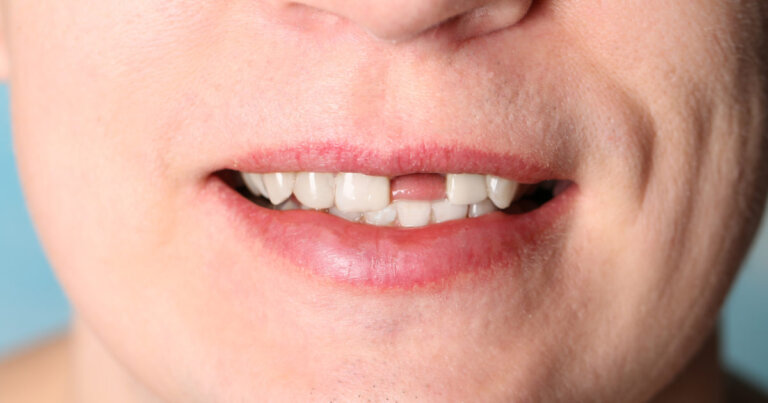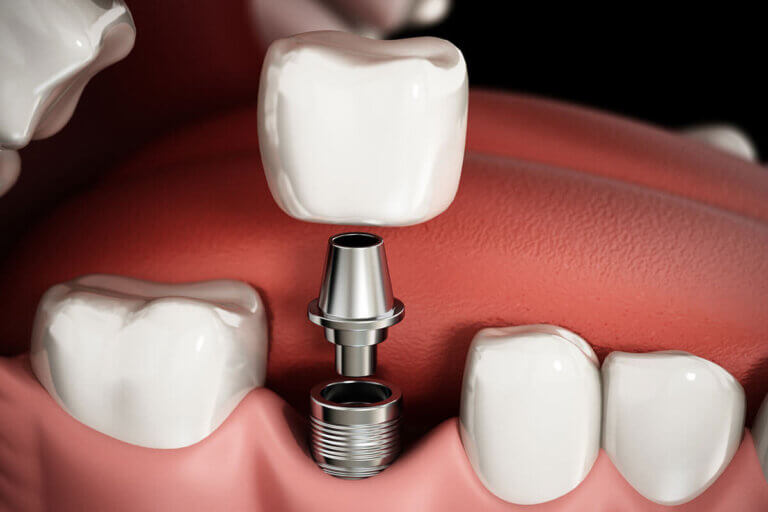Missing Tooth

What Is A Missing Tooth?
A missing tooth occurs when one or more teeth are absent due to factors like injury, tooth decay, gum disease, or congenital conditions. Beyond aesthetics, missing teeth can lead to difficulty chewing, speech impairments, and changes in facial structure. Understanding the causes, symptoms, and available treatments for missing teeth can help you maintain optimal oral health.
Before you contact a Toronto dentist to examine ways of replacing a missing tooth, there are some things you should know as a patient:
- Why Do I Have A Missing Tooth?
- Signs And Symptoms Of A Missing Tooth
- Treatment Options For A Missing Tooth
- Managing A Missing Tooth Until You Can See The Dentist
- Frequently Asked Questions About Missing Teeth
If you have questions about A Missing Tooth or other dental problems, please contact us for more information.
Why Do I Have A Missing Tooth?
There are several reasons why you may experience a missing tooth:
- Tooth Decay: Cavities that go untreated can severely damage a tooth, leading to extraction or tooth loss. Poor oral hygiene and frequent snacking increase the risk of decay.
- Gum Disease (Periodontal Disease): Bacterial infections in the gums can destroy the bone and tissue supporting teeth, leading to tooth loss. Advanced gum disease (periodontitis) often results from neglecting gingivitis.
- Trauma or Injury: Sudden impacts from accidents, falls, or sports injuries can knock out or severely damage teeth.
- Congenitally Missing Teeth: Some individuals are born without certain teeth due to genetic factors. The most commonly missing teeth are lateral incisors, second premolars, and wisdom teeth.
- Aging: Natural wear and tear, reduced saliva production, and bone density loss can lead to tooth loss in older adults.
- Smoking and Tobacco Use: Tobacco increases the risk of gum disease and slows healing, both of which contribute to tooth loss.
Identifying the underlying cause is crucial for determining the best treatment and preventing further tooth loss. If you have further questions about A Missing Tooth, please contact us.
Signs And Symptoms Of A Missing Tooth
If you’ve lost a tooth, you might experience:
- Visible Gaps: Noticeable spaces in your smile where the tooth used to be.
- Difficulty Chewing or Biting: Reduced efficiency when chewing, especially for hard or crunchy foods.
- Speech Issues: Trouble pronouncing certain words clearly due to missing teeth.
- Shifting Teeth: Surrounding teeth may shift into the gap, causing misalignment or bite issues.
- Bone Loss in the Jaw: Missing teeth can lead to bone density reduction in the jaw, affecting facial structure over time.
- Self-Esteem Concerns: Gaps in your smile may lead to reduced confidence and social anxiety.
Your dentist can examine your mouth and provide appropriate treatment options to restore your smile and oral health. If you have further questions about signs and symptoms of A Missing Tooth, please contact us.
Treatment Options For A Missing Tooth
Several solutions exist to restore your smile and oral function, including:
- Dental Implants: A titanium post is surgically inserted into the jawbone to act as a replacement root, topped with a crown. Implants are durable, natural-looking, and long-lasting.
- Dental Bridges: Bridges use adjacent teeth for support and fill the gap with a prosthetic tooth. They’re a good option for those who cannot undergo implant surgery.
- Dentures: Removable partial or full dentures can replace one or multiple missing teeth. Modern dentures are designed to look natural and fit comfortably.
- Orthodontic Solutions: In cases where teeth have shifted due to missing teeth, orthodontic treatment can realign teeth and either close the gap or prepare for a replacement tooth.
Your dentist will recommend a treatment plan based on the location, severity, and cause of your missing tooth. If you have further questions about treatment options for A Missing Tooth, please contact us.

Managing A Missing Tooth Until You Can See The Dentist
If you experience a missing tooth before your dental appointment, there are a few things you can do to manage the situation temporarily:
- Control Bleeding: Use gauze to apply gentle pressure if the area is bleeding.
- Protect the Area: Avoid chewing on the affected side and stick to soft foods.
- Use Saltwater Rinses: Rinse your mouth with warm salt water to reduce bacteria and inflammation.
- Avoid Sticky or Hard Foods: These can aggravate the area or cause further damage.
- Reinsert a Knocked-Out Tooth (if possible): If a tooth has been knocked out, rinse it gently and try to place it back in the socket. If this isn’t possible, store it in milk and see your dentist immediately.
It is essential to see your dentist as soon as possible to avoid further damage or complications. If you have further questions about managing A Missing Tooth, please contact us.
Frequently Asked Questions About Missing Teeth
- Can a missing tooth affect my overall health?
Yes. Missing teeth can lead to bone loss in the jaw, poor nutrition from difficulty chewing, and an increased risk of further dental issues.
- How soon should I replace a missing tooth?
It’s best to address a missing tooth as soon as possible to prevent shifting teeth, misalignment, and jawbone deterioration.
- Are dental implants suitable for everyone?
Dental implants require adequate bone density and healthy gums. Your dentist will evaluate if you’re a good candidate.
- What’s the most affordable way to replace a missing tooth?
Dental bridges and partial dentures are often more affordable than implants, though they may not last as long. Discuss all options with your dentist to choose the best one for your budget and needs.
Addressing a missing tooth promptly can restore your smile and protect your oral health. If you have questions or need assistance, don’t hesitate to contact us. Our team is here to help you find the best solution for your dental needs.

